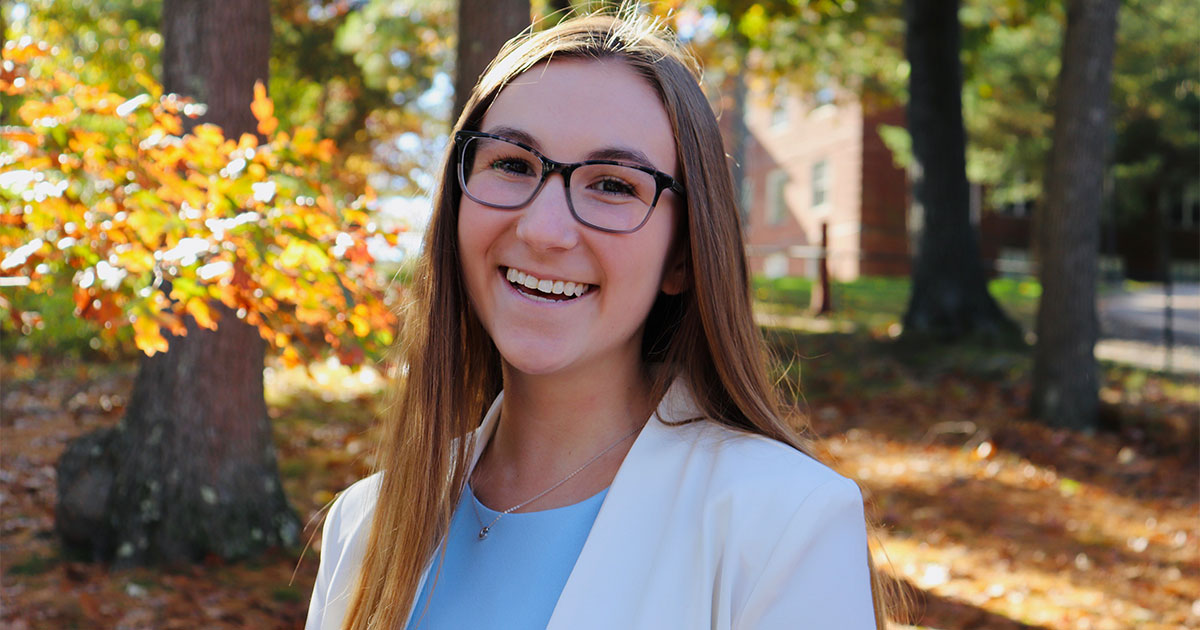Bringing Entrepreneurial Education to Others

For years, Colby Thomson ’23 has worked with young people with intellectual disabilities. The experiences have been rewarding. Serving as a teacher, mentor, and friend, she has formed close relationships and feels that she has made a difference in people’s lives. And, the work is fun.
“I love being around them,” she says. “I always go home and think, ‘That was a good day.’ ”
In high school, she was a member of Best Buddies, which pairs students with disabilities with their peers. Nowadays, she works part time as a job coach at Northshore Education Consortium, a provider of special education programs.
People with intellectual disabilities are often a group that finds itself ignored. They appreciate when someone takes the time to help them and spend time with them. “They feel noticed,” Thomson says. “There is never a lack of appreciation. They are super excited and want to be there.”
To better serve a population that has meant so much to her, Thomson has developed Entrebuddies, a special education curriculum focused on entrepreneurship. It is a fitting endeavor for a Babson College student who understands well the dynamism of entrepreneurship. “I love both business and working with people with disabilities,” Thomson says. “I consider myself lucky to be able to find a way to combine them, and create something that positively impacts a group of people I care so much about.”
For those with intellectual disabilities, Thomson says, the study of entrepreneurship can build confidence, provide job and life skills, and help them imagine new dreams of starting a venture. “They might never have thought they could do something on their own,” she says. “It gives people possibilities they otherwise wouldn’t know of.”
For her efforts with Entrebuddies, Thomson has received a prestigious honor. She was one of three Babson students, along with Swarna Shiv ’23 (founder of Unsmudgeable) and Alicia Sibole ’23 (former president of eTower), named to BostInno’s 25 Under 25 list.
Made to Feel Independent
Filled with activities and videos, the Entrebuddies curriculum goes through all the fundamentals of the entrepreneurial process, with students reflecting on their passions and values, identifying products and services they may want to sell, and learning about the basics of running a business.
The roots of Entrebuddies go back to Thomson’s high school days, when she and a couple of friends created an early version of the program. Thomson saw the effect it had on students, how it empowered them to sell products such as bracelets and paintings and also emboldened them to seek employment in the community. “They felt they were learning real things to use in life,” she says.
When students landed a position in a pizza shop or salon, they came running up to Thomson in the school hallway to tell her. “They were so excited,” she says. “That made them feel so independent.”
“They might never have thought they could do something on their own. It gives people possibilities they otherwise wouldn’t know of.”
Colby Thomson ’23, founder and CEO of Entrebuddies
Helping students become independent is a key goal for Entrebuddies, especially considering that state funding for people with disabilities typically ends at 22. “How do we get them to be successful and independent when they turn 22?” Thomson says.
When she came to Babson, Thomson became a Natalie Taylor Scholar, a Babson program in which students strive to make a positive social impact, and she began working on Entrebuddies again. Lisa Thomas P’18 ’19 ’21 ’25, Babson’s director of Social Impact Programs, has served as a mentor, offering advice and potential connections to make.
“Colby’s deep commitment to individuals with intellectual disabilities, and her innate ability to build relationships, is exceptional,” Thomas says. “Her efforts will reach hundreds of underestimated entrepreneurs, giving them the tools to create something that leads to economic stability.”
A Nontraditional Experience
The target age for Entrebuddies is 14 to 22, and it can be utilized in schools, organizations, or even at home by parents or guardians. The curriculum is currently in use by Northeast Arc, an organization in Danvers, Massachusetts, that helps thousands of people with disabilities live and work in their communities. Thomson hopes to bring it to other institutions soon. “It can be implemented everywhere,” she says. “I want to keep growing it. I want to get feedback from people who are using it and make adjustments to it.”
Such an entrepreneurial curriculum isn’t common for children, even beyond special education. “In education in general, there isn’t much of this, especially in early education,” she says. “I love working with special education departments, but there is a want for this everywhere.”
Thomson says those with intellectual disabilities particularly enjoy the curriculum because it’s different from the usual life skills training they receive. “It offers a nontraditional educational experience,” Thomson says. “When they get something different, they get super excited and focus on it way more.”
Thomson is set to graduate in August, after which she hopes to continue working on Entrebuddies part time while landing a job in the nonprofit sector. She hopes to one day become a special education teacher.
Posted in Community, Entrepreneurial Leadership




